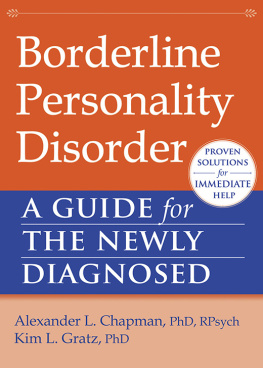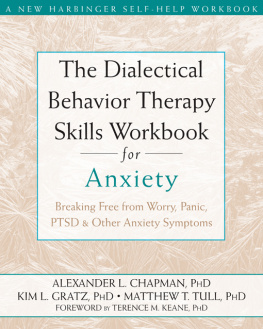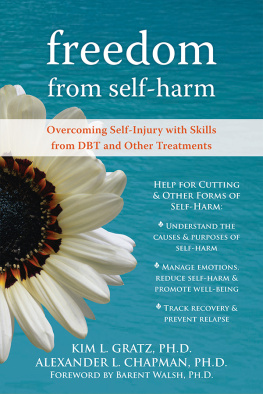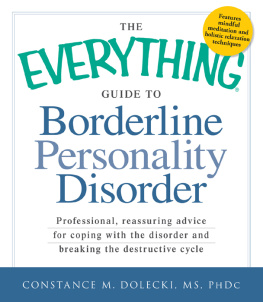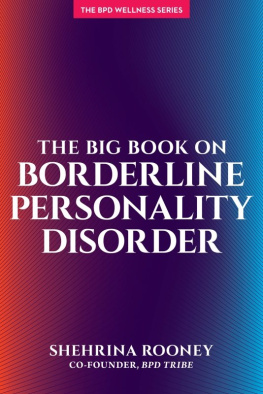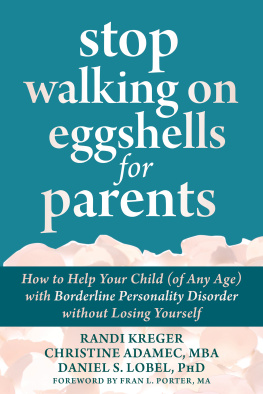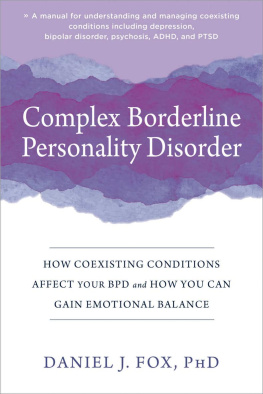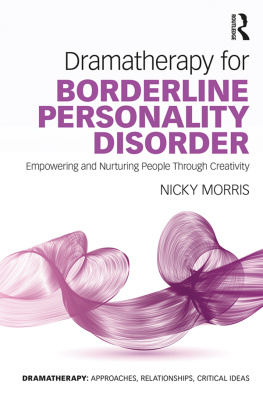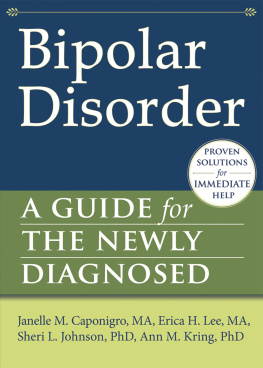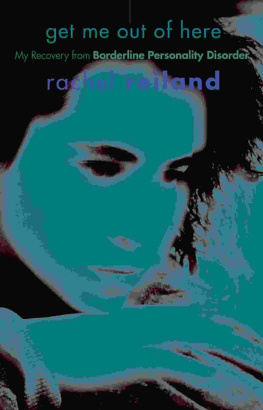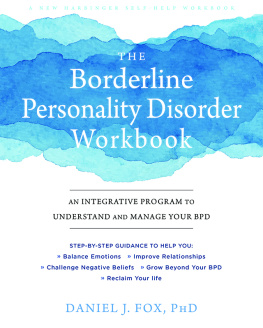Alexander L. Chapman, PhD, RPsych, is a registered psychologist and an associate professor in the department of psychology at Simon Fraser University, as well as the president of the DBT Centre of Vancouver. Chapman directs the personality and emotion research laboratory, where he studies the role of emotion regulation in borderline personality disorder (BPD), self-harm, impulsivity, and other behavioral problems. His research is funded by the Canadian Institutes of Health Research and the Social Sciences and Humanities Research Council of Canada. Chapman received the Young Investigator Award of the National Education Alliance for BPD (2007), the Canadian Psychological Associations (CPA) Scientist Practitioner Early Career Award, and a Career Investigator award from the Michael Smith Foundation for Health Research. He has coauthored five books, three of which received the 2012 Association for Behavioral and Cognitive Therapies Self-Help Book Seal of Merit Award.
Kim L. Gratz, PhD, is an associate professor in the department of psychiatry and human behavior at the University of Mississippi Medical Center, where she serves as director of personality disorders research and director of the dialectical behavior therapy (DBT) clinic. In 2005, Gratz received the Young Investigator Award of the National Education Alliance for BPD. Gratz has written numerous journal articles and book chapters on borderline personality disorder, deliberate self-harm, and emotion regulation (among other topics), and is coauthor of several books, including The Borderline Personality Disorder Survival Guide, Freedom from Self-Harm, and The Dialectical Behavior Therapy Skills Workbook for Anxiety. Gratz currently serves as principal investigator or co-investigator on several major grants from the National Institutes of Health.


Publishers Note
This publication is designed to provide accurate and authoritative information in regard to the subject matter covered. It is sold with the understanding that the publisher is not engaged in rendering psychological, financial, legal, or other professional services. If expert assistance or counseling is needed, the services of a competent professional should be sought.
Distributed in Canada by Raincoast Books
Copyright 2013 by Alexander L. Chapman and Kim L. Gratz New Harbinger Publications, Inc. 5674 Shattuck Avenue Oakland, CA 94609 www.newharbinger.com
Cover design by Amy Shoup
Acquired by Melissa Kirk
Edited by Jasmine Star
All Rights Reserved
Library of Congress Cataloging-in-Publication Data
Chapman, Alexander L. (Alexander Lawrence)
Borderline personality disorder : a guide for the newly diagnosed / Alexander L. Chapman, PhD, RPsych, and Kim L. Gratz, PhD.
pages cm -- (The new Harbinger guides for the newly diagnosed series)
Summary: Two experts on borderline personality disorder (BPD) present the fifth book in the New Harbinger Guides for the Newly Diagnosed Series. This easy-to-read book offers an introduction to BPD for those who have recently been diagnosed, outlines the most common complications of the illness and the most effective treatments available, and provides readers with practical strategies for staying on the path to recovery-- Provided by publisher.
Includes bibliographical references.
ISBN 978-1-60882-706-0 (pbk.) -- ISBN 978-1-60882-707-7 (pdf e-book) -- ISBN 978-1-60882-708-4 (ebook) 1. Borderline personality disorder. I. Gratz, Kim L. II. Title.
RC569.5.B67C46 2013
616.85852--dc23
2013023726
To those who suffer from BPD, I wish you freedom and joy.
Alexander L. Chapman
To all those who struggle with BPD, I wish you self-compassion on your journey toward recovery.
Kim L. Gratz
Acknowledgments
Id like to acknowledge many people who have both supported my work on this book and helped me make it as useful as possible to those suffering from BPD. First, Ive been fortunate enough to have wonderful mentors in my research work as well as in my clinical work, including Richard Farmer, Tony Cellucci, Thomas Lynch, Clive Robins, and Marsha Linehan. I am grateful for their guidance and wisdom. Second, I am so grateful to the clients with whom I have worked. Their courage in the face of overwhelming adversity is inspiring, and they have taught me more than I could have imagined about how to make my work and my writing as relevant as possible to what they struggle with each day. Finally, Id like to express appreciation for my wonderfully supportive family.
Alexander L. Chapman
I am extremely grateful to everyone who has traveled with me on this journey of helping those who suffer from BPD, including the mentors who trained me (Drs. Elizabeth Murphy, Liz Roemer, and John Gunderson), the clinicians who joined me on this path and devoted their time and energy to this lofty pursuit, and the clients who have graced me with their trust, courage, and commitment to recovery. I am also extraordinarily grateful to my DBT consultation team, particularly Katie Dixon-Gordon, for all that they do to help those who are suffering and to support one another through this process. I could not do this work without them. I am also incredibly thankful to have Daisy in my life, whose love and support makes everything better. Finally, as always, I am eternally grateful to Matt Tull and thankful to have him in my life. His love, friendship, encouragement, and support (both emotional and practical) make everything possible, and this book could not have been written without him.
Kim L. Gratz
Chapter 1
Youve Been Diagnosed with Borderline Personality Disorder: Now What?
If you are reading this book, chances are that youve recently been diagnosed with borderline personality disorder (BPD). If so, one question you may be asking yourself is Now what? Thats a very good question. More often than not, books, websites, and even treatments for BPD dont pay much attention to the immediate aftermath of receiving a BPD diagnosis or how to handle the questions and emotions you may experience in response. Some of these resources may jump ahead and provide information on BPD, such as its causes or the types of problems that people with BPD may experience. Others may jump even further ahead to the skills you can use to manage the symptoms of BPD. As helpful as all of this information may be, however, its okay to slow the process down.
Learning that you have BPD can be an emotional experience, both positive and negative, and you may not be ready to jump ahead just yet. The good news is that just learning that you have BPD and figuring out the next steps to take are crucial parts of the recovery process.
This chapter will lead you through some of the different things you can expect after learning that you meet criteria for a BPD diagnosis, as well as some of the first steps you can take once you receive this information.
Determining If the Diagnosis Is Correct
Being diagnosed with BPD can have a major impact on your life and the decisions you make about your mental health. Therefore, the first step after being diagnosed with BPD is to decide if you think the diagnosis is correct. To figure this out, you may want to consider who made the diagnosis and how it was made, and to ask any questions you may have about the diagnosis. Its also important to consider whether the diagnosis feels right to you. In the sections that follow, well take a closer look at each of these considerations.

